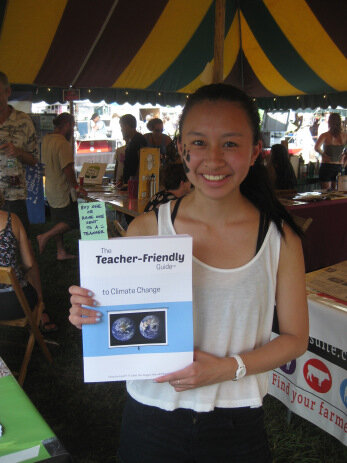The Teacher-Friendly Guide to Climate Change
On this page:
A guide for teachers (and others)
Find online chapters, download pdf, or purchase a hard copy of the guide
What people are saying about The Teacher-Friendly Guide™ to Climate Change
Teach Climate Science: toolkits, videos, and workshop information for teachers
News
The Teacher-Friendly Guide to Climate Change on Earth@Home
We are adding chapters of the Guide to PRI’s new free online learning platform, Earth@Home. You’ll find these chapters on Earth@Home’s Digital Encyclopedia of Earth Science. Guides to U.S. regional climates are found in Earth@Home’s Regional Guides section.
A guide for teachers (and others)
This book includes both the basics of climate change science and perspectives on teaching a subject that has become socially and politically polarized. The focus audience is high school Earth science and environmental science teachers, and it is written with an eye toward the kind of information and graphics that a secondary school teacher might need in the classroom. It is the tenth book in our Teacher-Friendly Guide series.
Online chapters (enhanced & updated digital versions of the original chapters):
Why Talk About Climate Change?
Evidence for and Causes of Recent Climate Change
Introduction to Past and Present Climate
U.S. Regional Climates:
Coming soon…
Midwest U.S.
Northeast U.S.
What people are saying about The Teacher-Friendly Guide™ to Climate Change
“Written by scientists and science teachers who know their stuff and who are excellent communicators! This book is a must-have guide for teachers who need the facts, unclouded by political agendas, in order to teach the science of climate change effectively.”
“This Teacher-Friendly guide does what it sets out to do – to provide teachers with the background for an effective discussion of climate change with their classes. And it does it very well, in a balanced, even-handed way...Not just for teachers, I would say—this is a readable factual introduction to the evidence for climate change, and the issues in dealing with it, for the general reader as well.”
“An excellent collaboration on one of the most important topics of our time. This is the perfect publication for those who want to have a better grasp on climate change - at the very least it’s a great place to start, but for the layperson it’s likely much more than that. I found the graphs and charts to be useful and accessible to my students (9th graders and 12th graders). Refreshingly, human induced climate change is not treated as a debate. The impacts of climate change are ongoing, thus it’s crucial that students receive a proper introduction to climate change in their science classes. I’m very grateful to the authors and publishers of this work.”
Teach Climate Science!
Our Teach Climate Science webpage contains resources such as classroom toolkits with activities aligned with Next Generation Science Standards, videos, and information about teacher professional development workshops on climate change and energy topics.
Help Us Help Teachers
We’re helping teachers educate students about climate change.
You can too!
Join us in sending The Teacher-Friendly Guide™ to Climate Change to every public high school science teacher in the US free of charge. Donate here.
We are in Year 2 of the Teach Climate Science Project. In our crowdfunding campaign’s first year, donors made contributions of all sizes that allowed us to send The Teacher-Friendly Guide™ to Climate Change to 50,000 high school science teachers.
Send us Feedback!
If you have used—or are thinking of using—The Teacher-Friendly Guide™ to Climate Change in your classroom or elsewhere, we would love to hear your feedback and suggestions. Please fill out our survey HERE.
Thank you to Sustainable Tompkins, Climate Generation, New York State Master Teacher Program, New York City Department of Education, and the Los Angeles Unified School District for helping to distribute The Teacher-Friendly Guide™ to Climate Change!
Español
El tema de cambio climático se ha convertido en algo tan polarizado socialmente y políticamente que puede ser incomodo en una conversación si no estás seguro de las opiniones de los demás sobre este asunto. Sin embargo, el cambio climático está ocurriendo, y es esencial tener un buen conocimiento de los descubrimientos e implicaciones de la ciencia de clima: el cambio climático es uno de los problemas más críticos de siglo XXI. En efecto, en el contexto del currículo de las escuelas, es difícil imaginar un tema que no está afectado por el cambio climático o el proceso de mitigar y adaptar a los efectos, entonces, potencialmente hay varias conexiones de este tema a casi todas las lecciones en clase.
A pesar de esta importancia, las ciencias básicas de cambio climático han aparecido menos de lo que se espera en la educación primaria y secundaria. Ahora su presencia se está acelerando, sin embargo, ayudando por la integración de cambio climático en las Normas de Ciencia de la Próxima Generación y hay muchos libros de cambio climático y algunos recursos excelentes del Internet a maestros para ayudar con la integración de cambio climático en el currículo. Sin embargo, hay pocos libros fácil de usar sobre el cambio climático escritos para maestros donde se puedan incluir conocimientos básicos de cambio climático y perspectivas para enseñar a comunidades de estudiantes de unespectro polarizado. Queremos reparar esa falta con este volumen.
Este libro es escrito para maestros que pueden beneficiarse de una guía fácil para ensenar el cambio climático. La audiencia en la que nos enfocaremos son maestros de high school que ensenan ciencia del planeta y ciencia del ambiente, pero esperamos que una audiencia más grande pueda utilizar el libro, incluyendo maestros de otros niveles académicos, temas o contextos y hasta personas que no trabajen en la educación que puedan encontrar este método útil. Sin embargo, las escuelas pueden que utilizar el libro para tener una estrategia efectivamente para incorporar el cambio climático afuera de los limites de asignaturas, incluyendo todos los sujetos de ciencia, técnica, ingeniero y matemática, estudias sociales y otras humanidades.
Can You Help Us?
The text above is the preface to The Teacher-Friendly Guide™ to Climate Change. We hope to translate the entire book into Spanish, and we seek to do this via unconventional means. We would like to crowd-source the translation! We are looking to recruit dozens of bilingual volunteers, each of whom would translate one or two pages of the book. If you feel comfortable translating a page – or know someone who could do this – please email [email protected] and let us know.
¡Muchas gracias!
Archived News
Cornell News Feature, September 20, 2019
Cornell University profiles Teacher-Friendly Guide author Ingrid Zabel on its website: https://alumni.cornell.edu/article/alumna-writes-go-to-guide-for-teaching-climate-change/ .
PRI wins Friend of the Planet Award
PRI won the 2019 Friend of the Planet Award from the National Center for Science Education, which recognized The Teacher-Friendly Guide to Climate Change as “the single best available resource for teachers on climate change.”
The Teacher-Friendly Guide to Climate Change at the PRI booth at NSTA 2018 – before they all disappeared! – despite the presence of the guard-ammonoid….
@NSTA 2018
PRI staffers Don Duggan-Haas, Alexandra Moore and Andrielle Swaby attended the 2018 National Science Teachers Association national meeting in Atlanta GA. Don received an award from NESTA for service to the organization. Yay! And we gave away ~1000 copies of The Teacher-Friendly Guide™ to Climate Change to teachers in 30 states.
Teachers at Port Chester High School model the Teacher-Friendly Guide to Climate Change. L to R: Joe Fontana, Renee Aubry, Mark Stabile.
March 10, 2018
Adam Gollwitzer, New York State Master Teacher at Chautauqua Lake Secondary School reviews TFG Climate Change:
“The organization of the book allows readers to dive in and get right down to the business of teaching climate change. The information is displayed in a manner that makes for quick reference (e.g. very helpful visuals and thought-provoking quotes) with enough accurate information pertaining to each that lessons can be quickly and effectively built around the central topics. I would say this book is a “must” for any teacher interested in accurately teaching climate science.”
Elizabeth Altier, Dryden High School Class of 2015, and PRI intern & geology major at Oberlin College, presents her teacher and mentor, Travis Crocker, with a copy of The Teacher-Friendly Guide™ to Climate Change.
Talking to Teachers
January 22, 2018, Dryden High School, Dryden NY
PRI staff met with Dryden High School teachers Travis Crocker and Eric Reisweber, both of whom teach Earth Science, along with Environmental Science and Astronomy. I asked Travis Crocker about teaching climate change.
AM: You say you are you excited to use The Teacher-Friendly Guide to Climate Change. Can you tell us why?
TC: The students in our school today – I work with sophomores and seniors – want to get excited about what they’re studying. They want to see the application of what they’re learning. They hear about climate change quite a lot, but often it’s filtered through the media – so they can get different messages – and there is certainly confusion when local events don’t seem to align with a warming planet. For example, when the eastern US is cold they wonder what happened to Global Warming? Students really need to understand the global perspective, not just what is happening locally. This is particularly true when they hear people say that climate change isn’t real, it is especially important to look beyond our back yard.
AM: Where do Dryden teachers go for resources?
TC: I usually start with NASA and NOAA. Many people don’t know that these organizations (responsible for most of our satellite observing systems) look down at the Earth as much as they look away to the stars. It is important for students to know why we make these observations and how they can record the changes on Earth and in its atmosphere. With respect to climate change, there is no more relevant topic that we can discuss with students. Many aren’t going to become scientists but they are all citizens and all citizen-scientists, voting and making decisions – we need educated citizens.
AM: How does climate change fit into the Dryden science curriculum?
TC: In our Earth Science courses we have a whole unit on climate change; both the Regents and Honors Earth Science classes include climate change in the meteorology and climatology elements of the curriculum. This is important because it is critical for students to understand where scientists stand on climate change. And interestingly, since we see many of the same students in both 10th and 12th grades we can see student engagement increase across those years.
AM: Do students get depressed by all the bad news?
TC: No – they get excited about affecting change. Our students recognize that they have power to make change through their own actions, and especially by who they ultimately vote into office.
AM: What resource – any kind – would you want to help students learn?
TC: A visit by Neil deGrasse Tyson! (my favorite scientist, known for saying, “science has the ability to see thru the BS”). Students respond well to a knowledgeable and charismatic scientist who can draw kids in and get them excited.
Are you listening Neil….?
October 30, 2017
The Teach Climate Science project is featured in the Nov/Dec 2017 issue of Sierra Magazine.
At the Grassroots Festival, July 24, 2017
The Teacher-Friendly Guide™ to Climate Change was represented this weekend at the Grassroots Festival of Music and Dance in Trumansburg, NY! The Teacher Friendly Guide was on the Cayuga Nature Center table at the Grassroots Sustainability Fair.
Above is a photo of Cornell Environmental Engineering student Cynthia Chu, who donated to the Teach Climate Science fundraiser to have a book sent to a science teacher who had an impact on her life. Cynthia wrote an inscription in the book that will be sent to her teacher as well. Thank you, Cynthia, for getting involved in our project!
If you would like to donate to the fundraiser and send a book to a specific teacher, email [email protected] with the name of the teacher, the name of the school, and the state that the school is in, when you donate to our campaign. You can write a personal message, or we can send your teacher a note thanking them for inspiring science students!
June 28, 2017
Check out this article, written in the Ithaca Times, about our campaign to get The Teacher-Friendly Guide™ to Climate Change into the hands of teachers!
Read it here: http://www.ithaca.com/news/the-new-climate-infowar/














